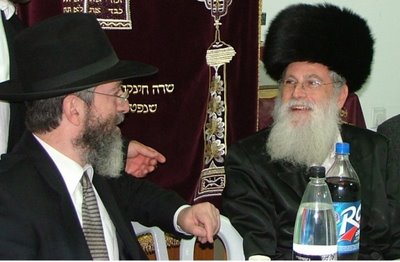(freely translated from the Hebrew by yitz)

He mentioned that he was born in Tiveria [Tiberius], and was orphaned from both of his parents at a young age. He supported himself as a fisherman, who worked through the night, sleeping during the daytime. After several years, he eventually got married, and shortly thereafter, they had a son. Not long after the Pidyon HaBen [redemption of the first-born son], his wife passed away. He was left alone with the young child. Fortunately, he had good neighbors in Tiveria, who helped bring up his son, as he needed to go out to fish every night. Baruch Hashem, they were quite successful.
When his father would come home from work each morning, his young son would serve him a hot cup of tea, help him get undressed, bring him his slippers and a towel to refresh himself with. Despite their impoverished living conditions, the father and son developed a very deep bond with one another.
The boy grew up, got married, and moved to a town in the southern part of Israel, far away from Tiveria. In those days, a journey from Tiveria to the south of Israel could take several hours, even the good part of a day. The son was financially successful, and from time to time he would send his father a golden Napoleon coin, which was worth a lot of money. His father asked him in a letter, “Why do you do this, why are you sending me these coins?”
His reply: “Abba, you gave so much of yourself for me, you did so much for me, and we were so close. I want you to save these golden Napoleon coins, and when you have enough, you’ll be able to purchase a decent house in which to live.” And so it was – he eventually had enough golden coins with which to buy a proper dwelling in Tiveria.
Later on, he received an urgent telegram message from his daughter-in-law: “Come quickly, your son is very ill!”
The father made the long journey to the south of Israel. Arriving at his son’s home, he stood by the sick man’s bedside, praying for him, as only a father can. (The Rebbe then told of the Chafetz Chaim, that when his son was very ill, no one told him about it, and the son passed away. He then scolded them, “Why didn’t you tell me? Don’t you know that the tears of a father can resurrect the dead?”) And indeed here, the father stood and prayed and cried for his son, and the young man recovered.
The father returned to Tiveria, and once more, the son began to send him the golden Napoleon coins. And again, the father wrote his son, “Why do you do this, why are you sending me these coins?”
This time, the son replied, “Abba, I want you to save this coins so that you can have a ‘pension fund’ for your old age, when you cannot work any more.” So again, the father saved these coins. As they accumulated, they indeed became a viable source of ‘pension’ funding.
Sure enough, he again received an urgent letter from his daughter-in-law: “Come quickly, your son is very ill!”
And once more, he made the long journey to the south. This time, however, by the time he arrived, it was too late – his son had passed away. All he could do was to cry at his bedside.
After the Shiva [seven-day mourning period], he returned home to Tiveria – to an empty house. He was back to “square one” – an orphan with no one and nothing in this world. He was so depressed that he wanted to die. One night, he had a dream, in which he saw his son in Gan Eden, lying in a golden bed. He began to run towards his son, but his son withdrew – he didn’t want his father to touch him, to come into the Olam HaEmes [the next world, the “world of truth” after death].
“I want to be with you again, next to you,” the father told his son.
“No, you need to stay in this world, and do mitzvos!” was the son’s reply. “Do you see this golden bed I’m in? This is made from the golden Napoleon coins that I sent you, from the mitzva of Kibud Av v’Em [honoring one’s parents].”
“But I just want to be with you!”
Then, in the dream, the son began to sing a niggun. And he continued to sing it, as his father joined in. They sang it together for a long time, until eventually the father learned to sing it by himself, alone. And then, the son disappeared and the dream was over.
“Then I awoke,” said the father to Reb Mottel Slonimer. “And whenever I’m sad, I sing this niggun. This is the niggun my son taught me.”
Said R. Mottel Slonimer: “This is the niggun of Kibud Av v’Em.” What is the niggun? This is the niggun that connected the father to his son, and to the next world... [Adds yitz:] A niggun made from the Golden Mitzva of Kibud Av v’Em.
***
The Piaseczno Rebbe Shlita then explained how many of the words of his great-uncle, the first Piaseczno Rebbe ZTvK"L, that are written in his sefarim are like niggunim: they sing to us and connect us to him.
Zechuso Yagein Aleinu, may the Rebbe zt"l's merits protect us!


Beautiful. Thanks, Yitz.
ReplyDeleteAwesome blog post, I really appreciate such quality content. For any pharma consulting services - quickly get in touch with Pharmaceutical Development Group. https://www.bloglovin.com/@pharmaceuticaldevelopmentgroup/what-is-importance-505b2
ReplyDelete